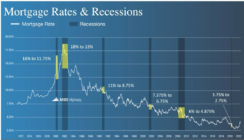
When I was researching today’s blog, I came across a December of 2010 blog of mine that said: “The refi boom is officially over.”
I found that amusing b/c rates were about 1/2 percent higher than they are today, b/c rates fell almost a full percentage point in 2011, and b/c we have had so many more “refi booms” since then – each one totally unexpected.
You can compare rates over the years here (check out October of 1981 when rates hit 18.5%).
In any case, we are here again with rates at surprisingly low levels.
So when does it make sense to refinance?
Here are a few considerations:
No Cost Loans: If a loan is “no cost” (the lender covers all non-recurring closing costs), it almost always makes sense. $50 per month in savings works out to $600 per year, and thousands over the life a loan. Many borrowers balk at refinancing for only $50 per month, but the entire process only takes a few hours (to provide documents, allow an appraiser to visit, and sign), so the payoff over time is significant.
Loans with fees: It is difficult to refinance smaller loans (under $200,000) at “no cost,” so there are sometimes fees involved. Similarly, some borrowers opt to pay fees for a lower rate. The rule of thumb is that the pay-back from the reduced payment should be in less than 4 years. For example, if non-recurring closing costs are $3,000, the payment savings should exceed $62.50 per month to make sure closing costs are made up in less than 48 months or 4 years.
Lender Requirements: FHA requires a borrower’s payment to be reduced by at least 5% of their current payment before they will allow a “streamline” (a refi that requires no appraisal) refi. And many conventional lenders require a payment reduction of at least $50 per month for a rate and term refinance. Lenders do not have savings requirements for cash-out refi’s.
Starting Amortization Over: Many borrowers are afraid to refi, even when doing so will lower their rate and monthly payment, b/c they do not want to start their amortization process over; they don’t want to push their final payment back out to 30 years again if they are six years into their mortgage, for example. This concern is misguided, however. If borrowers are careful to either apply their savings (from their lower payments) to an investment account or as extra principal payments, they will be able to pay off their loan faster than they if they had not refinanced at all.
Jay Voorhees
Founder/Broker | JVM Lending
(855) 855-4491 | DRE# 01524255, NMLS# 335646
























